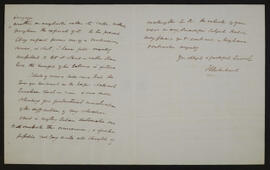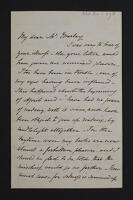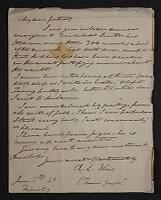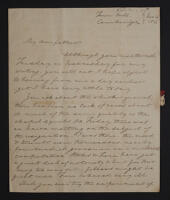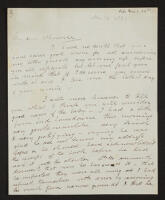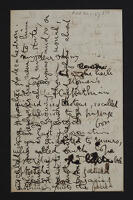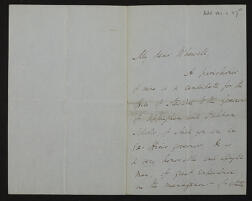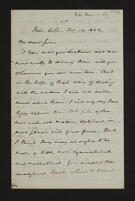One letter is dated 29 Aug. 1858, the other is undated.
Glenlair. Has been at Aberdeen, is now on holiday with friends, invites Litchfield, mentions friends Robert Henry Pomeroy and Wilfred Lucas Heeley, discusses different ways of summing up the personalities of friends.
Sem título129 Union Street, Aberdeen. Is pleased with the position at Aberdeen; reflects on his marriage [to Katherine Mary Dewar]; answers Litchfield’s questions with what he describes as a "metaphysical screed;" he gives his opinion on Catholics; a section apparently about marriage has been cut out; sends a paper set for his class and reflects on the quality of answers to the questions.
Sem títuloIncludes a letter from J. D. Gregory, 31 Oct. 1907 and a letter from Charlotte Warre Cornish dated 3 Oct. 1899.
Opening of the letter is preceded by a poem of 7 verses by Robert Leslie Ellis dated 12 Jan. 1848.
One letter dated 24 Feb. 1849.
129 Union Street, Aberdeen. Describes his work in Aberdeen, has found better textbooks by Galbraith & Haughton; has got up a model to show the motions of the rings of satellites; shares what he has been reading; comments on the Senior Wranglers and Smith’s prize men, has a student that he hopes will stay out of a small college “where boating billiards beer &c are more immediate paths to distinction that the pursuit of wisdom either mathematical, classical or social.”
Sem títuloGlenlair. His aunt Mrs Wedderburn has learned of the murders of her cousin John Wedderburn and his wife and child in the Indian rebellion, and her son John and his wife in Moultan have had to disarm troops and dismiss others; is glad to have read the letter [Robert Henry Pomeroy’s last?]; reflects on Good and Evil; has almost finished with his work on Saturn’s Rings; illness continues in the house of the little girl who died.
Sem títuloGlenlair – Reacts to news of Robert Henry Pomeroy’s death in the Indian rebellion and reflects at length on memory and grief; a little girl in one of his men’s houses has died; is at home for a month with his aunt Mrs [Isabella] Wedderburn.
Sem títuloGleinlair, Springholm, Dumfries. Describes a quiet life at Glenlair, and that he has not had a mathematical thought for a fortnight but is likely working subconsciously, shares news of friends and asks for more, notes how different his different his society is in Aberdeen.
Sem título18 India Street, Edinburgh. Describes his travels, including coming to the rescue of a woman afraid of some Wolverhampton revellers on the journey there, visits to family, mentions he was photographed four times at Peniciuk because of the light levels; J. F. MacLennan has been getting on with his “Law.”
Sem títuloGlenlair. Discusses travel plans, invites him to visit, is looking for a tutor for a friend’s two boys.
Sem título36 fragments, eight of them carrying notes as to which volumes they had been removed from. The group include two English fragments of the versified life of St Catherine (items 1-2), a 13th century fragment from the end of the Joseph story of the Poème Anglo-Normand sur l'Ancien Testament, removed from shelfmark K.3.77 (item 3), two fragments from the Avignon Selichot (items 7-8), two fragments from a medical text in Latin (items 9-10), a fragment on civil and canon law (item 17), and a fragment removed from Dr Hooke's papers carrying the header "Regulae Cromocritica de [Urina?]" inscribed by W. Derham as "Turkish writings & other Rhapsodical Receipts" (item 23).
Glenlair. Talks of plans and the amount of work to do at Glenlair, is fitting up a colour weaving machine fit for transportation, his top for doing dynamics; is studying the problem of Saturn’s Rings.
Sem títuloTrinity. Discusses plans to visit London; is looking through papers for some things not to be burnt, notes some are soft and good for packing; will take the Northwestern route to the north, notes that “the transition state from a man into a Don must come at last and it must be painful.”
Sem títuloTrin. Coll. Gives a report of Robert Henry Pomeroy’s illness; is busy with questionists regularly now, is about to get out some optical things to show them; has heard nothing from Cheltenham, Moderator [William Henry] Besant is recovering the use of one side of his face.
Sem títuloTrin. Coll. [Robert Henry] Pomeroy has formed a swimming club at Cambridge; has been busy with electrical reading this term and is working to come up with appropriate ideas, has been ‘sifting’ the theory of light and making everything stand upon experiments and definite assumptions, describes the difference between dogs eyes and human eyes.
Sem títuloPenicuik. Writes after leaving Cheltenham, describes leisure activities at Peniciuk: dog racing, walks, and snowball fights.
Sem títuloBank ground, Coniston, Ambleside. At Coniston reading and resting; discusses the well-regulated family of Charles Benjamin Tayler and their scheme of education; thinks studying the “dark sciences” will repay investigation.
Sem títuloBrasted - RJ has received a very positive letter from Lord Lansdowne concerning RJ's book ['An Essay on the Distribution of Wealth and the Sources of Taxation', 1832]: 'he had read it with the attention it so eminently deserves'. Having thus read the book he concluded that they [Ricardians] had fallen 'into error by reasoning too much from narrow grounds and that he values proportionably better views - sound inductions etc.'. Lansdowne wants RJ to call on him when in London. 'I am pleased - it is a good and leading opinion gained and apparently strongly gained and apparently strongly pronounced and you whose reputation is more than half committed to the book will not I am sure be above being pleased too'.
Trinity Lodge - WW has read RJ's lectures and is ready to discuss them with him: 'They appear to me to be full of the most valuable matters, delivered in most places with great force. But I think they may and ought to be made a little more symmetrical and methodical'. RJ should draw up an analytical table like the one WW suggested for the first five lectures [see WW to RJ, 28 March 1852]. There is a review of WW's lectures on morality in the Westminster Review ['Lectures on the History of Moral Philosophy in England', 1852, and 'Elements of Morality, including Polity', 1845, Westminster Review, October 1852]: 'It is plainly John Mill and I am rather amused to hear what is the amount of what can now be said of the best of Bentham's [Jeremy Bentham] school in favour of their master'. Mill wants to put the result of their controversy on the following issue: 'Whether the pleasures of animals - pigs, geese, lions for instance - are of the same moral value as those of man. He says yes, I say no. As to other matters he accuses me, as I accuse Bentham of reasoning in a circle'.

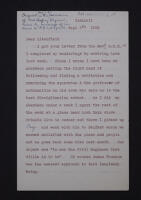
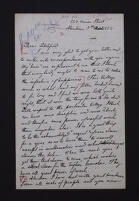
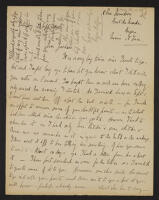
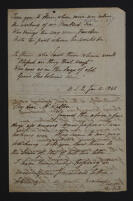
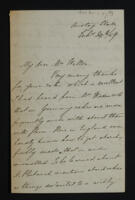
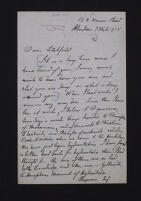
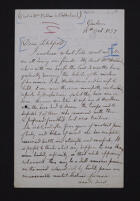
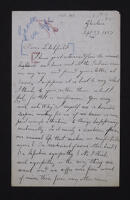
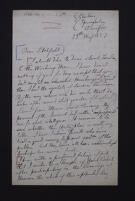
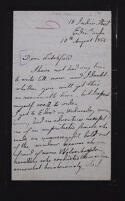
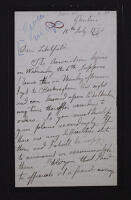

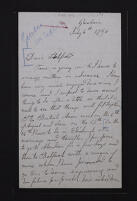
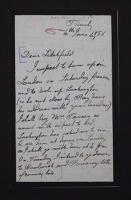
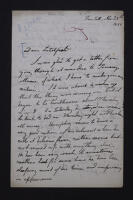
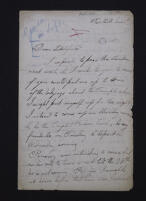
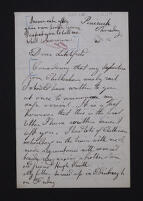
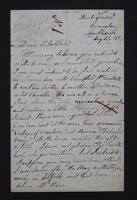
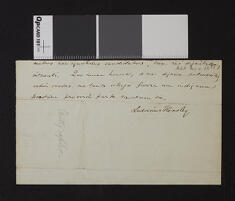
![Letters from Robert Leslie Ellis to [William] Walton](/uploads/r/trinity-college-library/1/1/9/11987adda4757c90c67cfbd14c03633a66a8b9bf39dd492c470967d12f265421/Add.ms.c.67.7-8_thumb.jpg)

